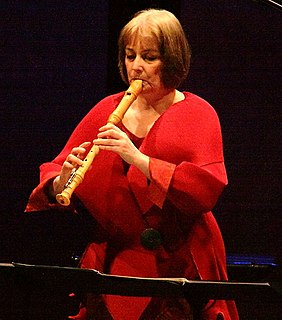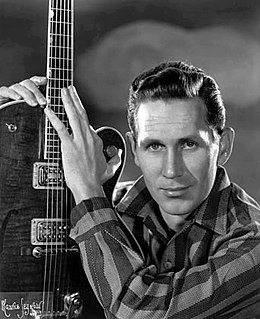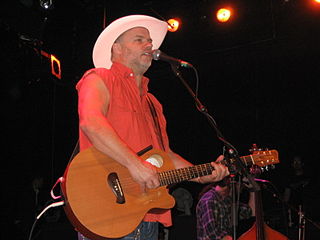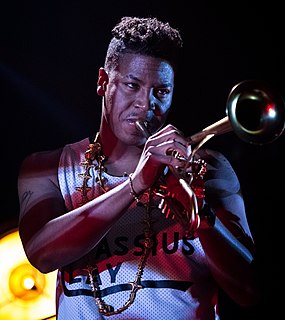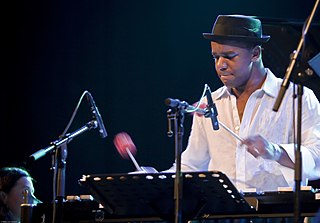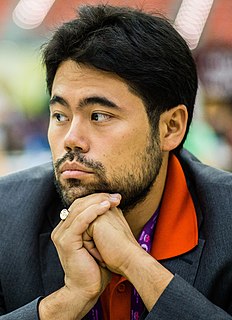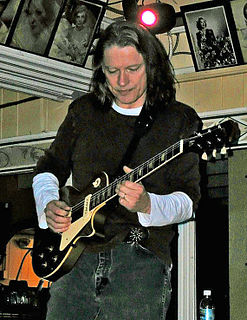A Quote by Michala Petri
I think that today, in Europe at least, people don't tend to think so much about the instrument that is producing the music; they are more interested to see if the musician actually has something to say.
Related Quotes
Lenny Breau is one of the true geniuses of the guitar. I suppose he is a musician's musician. His knowledge of the instrument and the music is so vast, and I think that's what knocks people out about him. But he's such a tasty player too. I think if Chopin had played guitar, he would have sounded like Lenny Breau.
I did, I was in Europe a lot. I would say, mid 20s to late 30s. Less so in the last ten or twelve years. Based on some political stuff and other things, I think I'm not the only musician, the only American jazz musician that's not going to Europe quite as much. I think we're seen a little differently in the world, unfortunately, than we were pre-Iraq invasion and things like that.
I do think the smaller-scale studio works have that incredible love of data crunching, whereas I would say the large-scale earthworks tend to be much more stripped-down. With the mappings, as connected as they are to a much more analytical idea, what's a map? And can I make a map about time? I think the first time was Hurricane Sandy, the flood plane; a moment in time, but indelibly marked on any of us who were in the city. Mapping time is something that I'm really interested in.
The music that I play is much more accepted in America. Do you know what I mean? Americans recognize and not necessarily country music. I go to a lot of places in Canada and they go "I don't like country music" and they think I'm a country musician. When I am a country musician but not a country musician like they think of.
What we're doing now, is to try to eradicate the limited notion of how people are interacting with each other through hyper-racialized ideas. A lot of it deal with, as an example, genre. If I ask you to visualize a trap musician or a hip-hop musician, you'll see one thing. If I say visualize a western classical musician, you'll see a very different thing. A lot of how music is disseminated to us is hyper-racialized. It's not something that we think about all the time, but if you take a minute to look back, it's why you get this argument when there's a white rapper.
I think it all comes back to the individual. My instrument's just a pile of metal and wood! If you listen to the way I speak I have a lot of rhythm, use a lot of accents. When I'm playing my instrument that concept comes through very clearly. In fact some people who've seen me play have noticed that I'm singing - but it's more that I'm actually speaking. So it's not really about the instrument. But for me, in my thinking, the music is all about the melody. When I compose, 99 percent of the time I start with the melody.
I'm especially interested in what I call practitioner criticism, which is when people who practice an art form start writing about it on blogs. I think that's an immensely important development. I want to see much, much more of that. People who make music who are verbally articulate. And not all musicians are verbally articulate. But those who are should be encouraged to write about what they do and their perception of what other people do. It makes the discourse smarter.
I think the right way to do this is just to step up and do it, so I actually think we'll see more of that over the next coming weeks, because I think they'll say, "We'd like to be good for business and quiet on politics, but this is too urgent, it is too much of a key crisis in who we are going to become as Americans. We can risk too much, and so we have to step forward." And I think you will see more and more people stepping forward, like Howard Schultz, Steve Case and other folks, in order to try to make a difference in this [Donald Trump] election.
If you talk to some of the older players, they definitely say they see beauty in certain games. In my case, there are certain times when I think, 'Wow, that's so amazing, chess is so full of ideas.' But most of the time I tend to be much more pragmatic about it, as opposed to thinking about it as art or something exquisite.
I think I'm better at producing than I am at being a songwriter, but it doesn't change the fact that I still have a desire to play and write songs. I've never wanted to be a career musician. But I still love to play and write. It's a big part of who I am. Songwriting is not particularly easy for me. I think it would be easy for me if I didn't have such high restrictions and feelings about what I want my music to be. I'm not precious at all when it comes to producing music and I can bring that to an artist and let them expand their horizons.
I don't find a lot of people actually saying things through music any longer. They are not trying to say anything with their music, they just want to make money with it. I think it's important to actually say something real, something meaningful, rather than just write some trash and try to sell it.
I played the vina until my heart turned into the same instrument. Then I offered this instrument to the Divine Musician, the only muscian existing. Since then I have become His flute, and when He chooses He plays His music. The people give me credit for this music which, in reality, is not due to me, but to the Musician who plays his own instrument.
I know that my music is heard a lot in commercial circles. In academia, I think my music is taken in differently but I'm not sure why that is. Some kind of sixth sense tells me that people in that world are thinking differently about it. I don't know if it has to do with the structure of my music, which is probably more apparent to those in the academic world than it is in the commercial world, where people tend not to think of that aspect of music so much. They just listen for pure enjoyment.
